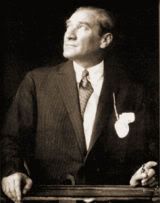There are certainly heroic acts that occur in battle, or at the scene of a fire. But not all acts of warfare or public safety are heroic, so not all soldiers or public servants are automatically heroes. It wouldn't be necessary for me to point that out if it weren't for the fact that we're increasingly encouraged to think in those terms.
A letter in the Boston Herald on the eve of the marathon this year referred to the "20,000 heroes" who would be running in the race the following day. Bullshit. They're not heroes -- they're runners. As far as I know, there was only ever one hero associated with marathons, and that was this guy, and even that story probably isn't true.
On the other hand, no one can overstate the heroic value a man has to the man whose life he was wounded or killed saving or serving, nor his friends or brothers-in-arms.
So I begin to see that my irritation with the way we use the word has to do with the way were encouraged to make all potential heroes into public heroes. It has killed the word. The common use forces people to have to distinguish real Heroes from all the heroes out there, which they shouldn't have to do.
And since my objections have more to do with the way the word is used than the word itself, I'm starting to drill down to this:
Once the media have labelled a hero, their supposed heroism isn't allowed to stand for its own sake. Instead it is used as a sword to defend its larger context. I'm thinking, of course, of the invasion and occupation of Iraq. If all soldiers are heroes, then the war is an heroic endeavor. They seep into each other, such that criticism of the war becomes de jure criticism of the heroes.
The reason we permit this is that we're lazy with language. And we wind up fooling ourselves. But the real hurt is done to our soldiers, some of whom can't see that in our hatred and dismay over the war, we don't hate or despise them. At least, I don't, in general. The trick has robbed us of allowing heroism whilst condemning its context. That impossibility highlights the distinction between public heroes and intimate heroism. It also might explain why I wander off this map and into a discussion of our cultural heroes.
I think that's what we're fighting over, really. Because we can't agree on the justness of the war, we seem to rob the hero of his due. If the war were just (if any war is just), the men and women who fight it get public glory. Public glory is what they sell you as a kid. And I have a hunch it's what the recruiter is peddling as well, at least by implication. Perhaps a soldier comes to think of it as part of his pay.
But we've come so far and fought so many questionable wars, that most Americans aren't willing to offer the unfettered adulation our grandfathers received at the end of WWII. And that must hurt.
 The more I write about this and think about it, the more hollow the note of "hero" is starting to sound. I'm thinking of a personal 'hero' of mine, Kemal Ataturk (pictured) -- a quintessentially public hero. He was often brutal and mean. But he had great vision and force of will, and an egalitarian and democratic dream.
The more I write about this and think about it, the more hollow the note of "hero" is starting to sound. I'm thinking of a personal 'hero' of mine, Kemal Ataturk (pictured) -- a quintessentially public hero. He was often brutal and mean. But he had great vision and force of will, and an egalitarian and democratic dream. The more I play this song, the more I think "hero" can't be a word that applies to a man.
I think it is a word about myths and gods, and that only our acts can be heroic, never our selves.
More to come, no doubt.
No comments:
Post a Comment